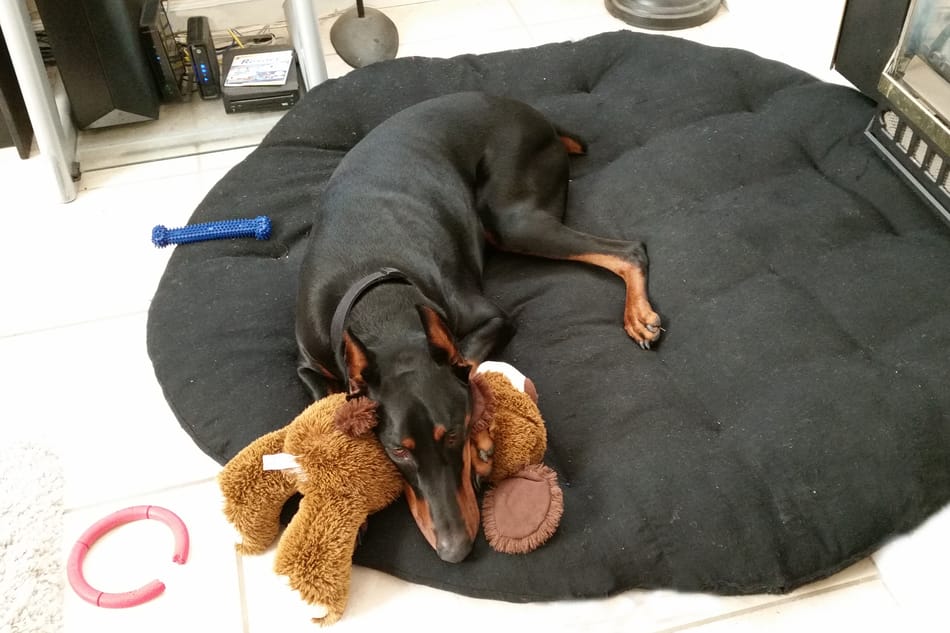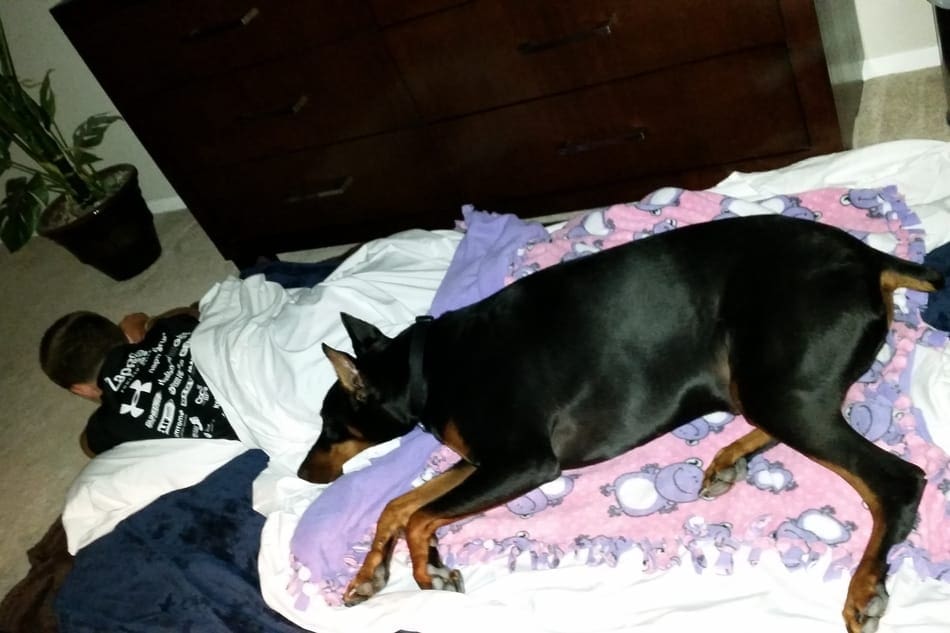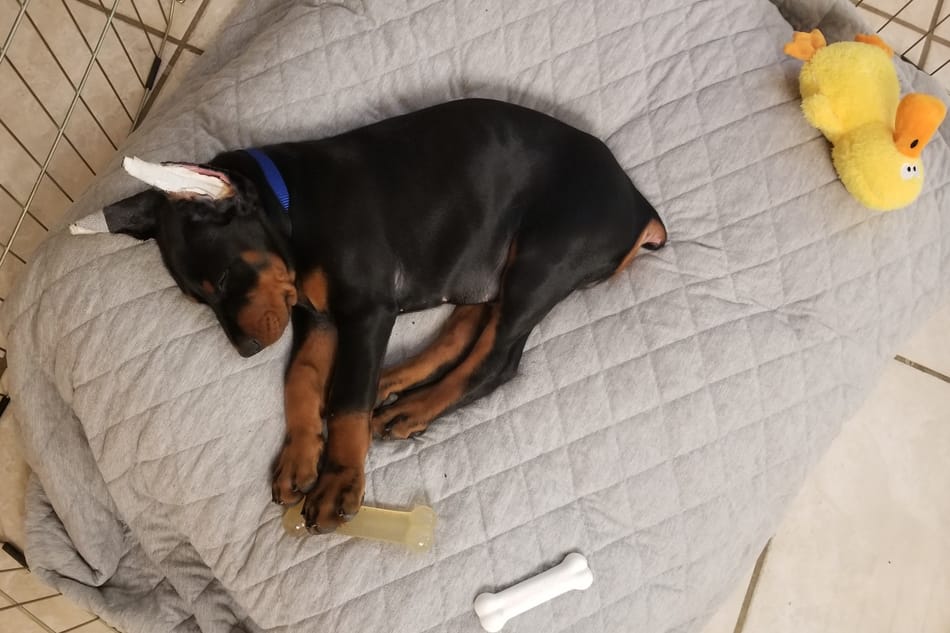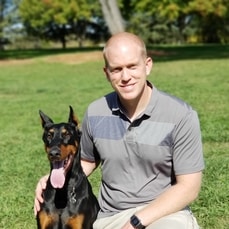
As Doberman owners, we always want to make sure our dogs are healthy and happy. To do this, we keep an eye out for behaviors that seem out of the ordinary. So when it comes to our Doberman’s sleeping habits, how do we know when they’re getting the right amount of sleep versus when they might be sleeping too much?
How long do Dobermans sleep? The average Doberman should sleep about 12 to 14 hours per day, including during the night.
Even if they don’t fully wake, they are aware of sounds around them like passing cars or unfamiliar footsteps that may signal danger. This means it takes 12 to 14 hours to fully recharge their energy over a 24-hour period.
Adult Doberman Sleep Cycles and Habits
According to the AKC, when Dobermans sleep, they cycle through the same levels of sleep that humans do, including SWS (short wave sleep) and the deepest sleep, REM (rapid eye movement) sleep (source).
However, our dog’s sleep cycles are very different from ours. In a 24-hour period, we may sleep 8 to 9 hours a day and spend the remaining 15 to 16 hours awake. But like other large, active breeds, Dobermans tend to experience deep sleep for around 15 minutes and then 5 minutes awake. This may not be a wide-awake state, but they’re still alert to their surroundings (source).
This is because of the Doberman’s innate protective instincts. Whether from the ‘old days’ when he needed to guard the pack or today when he wants to protect our family, Doberman’s are constantly sensing signals around them, even in their sleep. This means they awaken more easily. If you’ve ever tried to sneak past your Doberman while he or she was in this state, you know how easily they will wake up.
Often they wake before they have had a chance to finish a full deep REM cycle. This is why it takes 12-14 hours to fully collect the amount of restorative sleep they need.
TIP:
There’s a good discussion between Doberman owners on this forum about how much sleep they typically see from their Dobermans on a daily basis.
What happens when my Doberman falls asleep?
In people, the change from SWS sleep to REM sleep is one long cycle. But dogs, including Dobermans, go through these phases much more quickly.
As soon as your dog falls asleep, his heart rate will lower and his breathing will slow. This is his SWS sleep stage. After about 10 minutes, he will sink into REM sleep. Like humans, dogs dream in this stage. Have you ever seen your Dobie’s paws twitch as they sleep? This is a sign they are in REM sleep and dreaming. Another sign is their eyes rolling under their eyelids.
“A large dog that has an active day outside may sleep more soundly and experience longer phases of REM sleep, giving him more time to dream.”
– Lynn Buzhardt, DVM, VCA Animal Hospital
But their protective senses are still listening to everything going on around them. Unfamiliar footsteps, a passing car, or an unexpected noise will cut through their dreams of hunting down that squirrel outside and bring them right back to their primary duty—alert watchfulness.
Because Dobermans can reach REM sleep so fast, they don’t need the long uninterrupted hours of sleep that we do. Whereas we would be cranky and tired after lots of short bursts of sleep, dogs handle it just fine. They have the ability to get all the necessary REM sleep in small pieces throughout the day.

How Long Do Active Dobermans Sleep?
Active Dobermans need about 16 hours of sleep per day, or roughly two hours more sleep than an average Doberman. The more active they are, the more sleep they’ll need. Often though, short burst naps throughout the day often do the trick.
It’s important for Dobermans to get plenty of exercise, which in turn regulates their sleep cycles. I recommend 1 to 2 hours a day of exercise to start, but some dogs certainly need more. This can be a combination of daily walking, general aerobic exercise, playtime, and mental stimulus.
A minimum walk should be 30-45 minutes a day at least once a day, although twice a day would be better if possible. Also, it’s definitely best if it’s a quick pace.
Because a walk alone won’t tire out a strong, energetic dog like your Doberman, adding in some activities that involve running and jumping will help increase muscle tone and burn off that extra energy in the process.
How Long Do Dobermans in Heat Sleep?
Some Dobermans will sleep longer at the start of their heat cycle, but most will sleep a few hours less per day until the cycle passes.
Dobermans in heat are experiencing extreme hormonal changes that last about 2 to 4 weeks (source). Usually, these changes come with an increased restlessness that may increase to a powerful distraction that makes getting sleep much more difficult.
How Long Do Pregnant Dobermans Sleep?
A Doberman who is pregnant may sleep 2 to 3 hours more than normal throughout the day, or about 14 to 15 hours total.
As a Doberman’s pregnancy continues, she will become increasingly tired. The extra weight and hormonal changes will consume a lot of her energy. But more importantly, her body will be using a lot of energy to grow the puppies inside her.
Early in the pregnancy, make sure your dog gets light exercise like walks or easy fetch games. By middle to late pregnancy, it’s usually best not to allow any strenuous activities.
However, complete inactivity isn’t healthy either. Short walks on flat walkways a few times a day can help keep her healthy as the whelping time approaches.
For some of the typical signs Dobermans will display when they’re pregnant, take a look at my article 5 Signs Your Doberman is Pregnant: Week-by-Week Changes.
It’s always a good idea to consult with a qualified veterinarian as soon as you suspect your Doberman might be pregnant so you can develop a plan to ensure the healthiest possible outcome for your dog and her puppies.
How Long Do Elderly Dobermans Sleep?
Elderly Dobermans tend to tire easily and may sleep 17 to 20 hours a day depending on their age and general health.
Our Doberman friends who have spent years bounding around through our yards and protecting us at every turn have earned a little extra rest.
When possible, they should still exercise. But now that your dog is older the periods of exercise may be shorter and less intense before they need a short nap to recharge. It’s important to encourage senior dogs to stay as active as possible, under the guidance of your veterinarian. This can help prevent muscle stiffness and depression.
How Long Doberman Puppies Sleep (Puppy Sleep Schedule)
Doberman puppies under one year of age generally sleep between 16 to 20 hours per day.
Doberman puppies are bundles of adorable energy. They will race everywhere at top speed, but then it’s like a switch is flipped and they will almost fall asleep instantly wherever they happen to stop moving. A very young puppy may nap every hour more. These naps can last from 30 minutes to two hours.
Doberman puppies sleep 16 to 20 hours a day on average. They are growing at a rapid rate and that internal work combined with excited external play requires a lot of recharging.
Puppies will gradually transition towards an adult’s sleeping patterns over the first year. The following shows the average amount of sleep you can expect from your Doberman puppy during the first twelve months.
| Age | Hours of Sleep (per Day) |
|---|---|
| 0-2 months | 18-20 hours |
| 3 months | 17-20 hours |
| 4 months | 16-19 hours |
| 5 months | 15-19 hours |
| 6 months | 15-18 hours |
| 7 months | 14-18 hours |
| 8 months | 13-17 hours |
| 9 months | 12-17 hours |
| 10 months | 12-17 hours |
| 11 months | 11-16 hours |
| 12 months | 10-16 hours |
How to Help Your Doberman Puppy Get the Best Rest Possible
- Let him sleep. Nothing is cuter than a snoozing puppy and the urge to cuddle him may be almost irresistible. That’s ok to do, just make sure you give your pup at least a little bit of time to sleep by themselves too. You don’t want him to begin depending on your lap to fall asleep.
- Have a special spot. Set up a spot for naps, like a crate, dog bed, or even just a pile of soft blankets in a safe corner of the room. Show him where it is when he looks sleepy. After a few times, he will learn to go there himself when he needs to rest.
- Set a routine. Dobermans absolutely love routines. Plan plenty of activity for your new puppy, but also plan rest time as well. Dobermans are incredibly energetic and love to interact with you. They may not realize how tired they are getting in all the excitement.
Example Puppy Sleep Schedule
Below is a very general sleep schedule for a Doberman puppy that I created from observing my own Dobermans. This is merely an example and is far from scientific. Remember that each dog is an individual and this will vary.
- Morning: Wake up, eat breakfast, light play, and a short nap (approximately 1 – 2 hours long).
- Afternoon: Heavy playtime or socialize with other dogs, eat lunch, and a longer nap (approximately 2-3 hours long).
- Evening: Light/heavy play, nap (approximately 2 hours), training time, dinner, relax with family, and an evening nap (approximately 1 hour).
- Night: Sleep approximately 10 hours (broken up by trips to the bathroom every 2-4 hours).
Please note that many of these estimated nap lengths will be broken up in the form of multiple short nap sessions spread out over that portion of the day.
I wrote a very in-depth article all about the average sleep times of a Doberman puppy and how to tell if they’re sleeping too much. See What to do About a Lazy Doberman Puppy: Average Sleep Times.

How to Tire Out a Doberman for Better Sleep
Dobermans are both smart and energetic, so you need to tire them out physically and mentally. A mixture of strength-building and endurance exercises will keep your dog in peak condition. Take a look at How to Exercise and Build Muscle in Your Doberman Pinscher for some help if you’re getting serious about exercising your Dobie.
Besides the walks mentioned above, some full-fledged runs on a non-cement surface are a great way to help him let off steam. Because of their agility, Dobermans excel at games like frisbee and catch.
Dobermans don’t completely finish growing until somewhere around 2 years of age (or possibly a little longer). To build their muscles, which is especially important during that time, they should have a diet with a lot of protein. They also benefit from resistance exercises. Activities like running uphill, swimming, and tug of war help to build muscle and tire them out.
Adding weight, like a backpack, can also help exercise your Doberman and tire him out. But in general, the weight of the pack shouldn’t exceed 10% of your dog’s weight. You can go up to around 25% of your dog’s weight if all your dog is doing is hiking and your dog is used to the backpack. But if you’re just starting out, start light. See my list of recommended walking and hiking gear here for ideas on which packs work the best for Dobies specifically.
Beware of overheating. That beautiful black coat absorbs heat and it can lead to your Doberman getting overheated. Make sure he drinks plenty of water as he plays. If you think he is getting too hot, limit the activity and head for some shade or even let him take a swim.
There are a number of toys that’ll help burn up a large dog’s energy that also work really well for Dobermans.
- Jolly Ball (Amazon Link). This ball is designed to be difficult to bite and almost impossible to destroy. It was originally designed for horses but has quickly become a go-to for Doberman owners. It comes in several sizes, but I’ve found this 8-inch one seems to be the best fit for most Dobermans. This is by far my Dobie’s favorite outdoor toy.
- Flirt Pole (Amazon Link). This toy features a long handle with a rope and a toy at the end. You control the exercise by moving the pole and flipping the toy around at the end while the dog chases it. It is a fast way to tire a dog out, allowing you to work your dog while remaining fairly stationary yourself (and it works well in a small area). Although the one I linked to above is fairly durable, you still just need to be careful he doesn’t destroy the pole.
- Spring Pole (Amazon Link). A Spring Pole is similar to the Flirt Pole except you don’t need to be present. A spring is connected to a rope firmly tied to a branch or beam. A tempting toy dangles at the end. If your Doberman likes tug of war, he will probably like a Spring Pole as well.
Best Places and Conditions for Dobermans to Sleep
For puppies and young Dobermans, I highly recommend using a crate, especially at night. Line the crate with soft blankets or use a washable dog bed. Avoid wool or woven fabrics that dogs may chew and swallow. I have some specific recommendations for beds and crates on my recommended Doberman puppy products page.
Sometimes a soft toy or even a t-shirt that smells like the puppy’s mother can soothe your new puppy while he or she is inside their crate at night.
You may want to think about placing the crate in your bedroom so he can feel close to the family—this will also help reduce nighttime crying.
TIP: Dobermans whose owners have good grooming habits are generally healthier and sleep better. If you haven’t been staying up on bathing your Doberman, see How to Bathe a Doberman: Bathing Schedule and Guide.
Older, trustworthy dogs can be allowed to sleep on a dog bed positioned in a corner or somewhere they can see the entrance to the room. Facing the entrance to the room is a natural protective instinct for Dobies and if you position your dog’s bed for this it’ll help them feel more comfortable.
Worst Places and Conditions for Dobermans to Sleep
Dobermans will generally not sleep well if they haven’t had enough exercise or attention. If they haven’t had enough opportunities throughout the day to release their huge energy reserves and challenge their minds, their natural sleep rhythms will be disturbed. This can lead to destructive behaviors like excessive chewing, barking, or digging.
While it’s commonly believed that Dobermans (or any breed), should not sleep with you in bed, research seems to be proving otherwise. The AKC is not against letting your dog sleep with you, as it can ease anxiety, among other benefits. In fact, 45% of owners say their dog sleeps in bed with them (source).
The biggest downside seems to be the differing sleep habits of humans and dogs causing you and your dog to annoy each other during the night, leading to restless sleep. I know my Doberman constantly getting up and laying back down closer and closer to me throughout the night definitely causes me some disturbances!
Some sleeping conditions that are not beneficial for a Doberman, include:
- Outdoor shelters in unfavorable weather conditions.
- Sleeping on hardwood, tile, or other types of hard flooring with no padding.
- Noisy or chaotic environments.
- Areas where your dog will feel “exposed” while they sleep (remember dogs like a safe den by nature).
- Sleeping in any other place where your Doberman does not feel safe, secure, or comfortable.
How Much Sleep Is Too Much?
Although Dobermans do need a lot of sleep, too much sleep can be a sign that there is something wrong. Often it can be difficult to tell when the line is crossed from necessary sleep into excessive sleep.
But if you see any of the following signs, it may be time to have a vet examine your dog for any underlying issues.
- Extreme lethargy – If your normally active dog suddenly begins sleeping more than he usually does, and if he seems less energetic when he’s awake, it may be time to see a vet.
- Trouble breathing – Dogs can get sleep apnea just as humans can. This is a condition where your dog will stop breathing for a few moments while sleeping. It’s not very common with Dobermans, but if you see it (or hear it), it may sign of a deeper issue.
- Other symptoms – If you notice other changes in your dog’s health or behavior at the same time he seems to be sleeping more, it may be a red flag that something is wrong. These other symptoms might be things like loss of appetite, unusual bowel movements, decreased interest in favorite activities, moodiness, or unexplained whining or crying.
- Ongoing tiredness – Like people, dogs may sometimes sleep a little more or a little less over a given few days. But if your dog’s lethargy continues, it also may be time to speak with your vet.
Common Sleeping Positions for Dobermans
There are certainly a few positions that are common for Dobermans to sleep in, including:
- On their side, all legs stretched out. This means he is very relaxed. If he exposes his belly a little he may be trying to cool down.
- On their back, all legs in the air. This is a very secure dog since his belly and neck are exposed. It’s also the most difficult position to rise from. Dogs in this position feel extremely safe and content.
- Curled up. This is a more defensive position. It’s the easiest sleeping position to spring up from, but the least comfortable. However, occasionally dogs sleep like this to maintain body warmth.
What May Cause Sleeping Changes?
If your dog is sleeping more than he should be, there might be several causes. Here are a few examples of possible explanations, although please keep in mind it’s best to consult with your veterinarian to determine the root cause.
- Depression – Loss of a loved one or major life change may cause depression in dogs similarly to humans. In most cases, this will pass in a few days or a week or two. But if it does not, veterinary help is needed.
- Shifts in routine – Moving and/or changing an established daily schedule may temporarily affect your dog’s sleep patterns. Once he gets used to the new routine, things should return to normal with your pup.
- Poor nutrition – Dobermans have distinct nutritional requirements. If your dog isn’t getting enough food and water, or the right amount of protein, vitamins, and minerals from the food, he may become lethargic.
- Other conditions – Underlying health issues may make your dog more tired. Excessive tiredness can be a symptom of parvovirus, diabetes, Lyme disease, hypothyroidism, anemia, dilated cardiomyopathy (DCM), viral or bacterial infection, and other health issues.
As owners of this smart, energetic, and loving breed, we want to take as good care of them as they do of us. Just being conscious of your dog’s normal sleep and exercise habits, and noting any changes, can help prevent minor health issues from becoming major ones.
Related Questions
Should my Doberman sleep with me?
A Doberman puppy should generally sleep in a crate at night near their owners, but not on their owner’s bed. An adult Doberman, however, can sleep with their owners on occasion without danger of it leading to significant behavioral problems.
Where should my Doberman sleep?
At night, a Doberman puppy should sleep in a covered crate near their owner’s bed, preferably where the puppy can see its owner. An adult Doberman can sleep anywhere inside the house where they feel safe, secure, and comfortable.
Why does my Doberman sleep on me?
When a Doberman sleeps or leans on their owner, it’s a sign of affection. It means the dog trusts you and wants to be close by your side.


